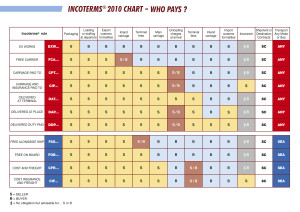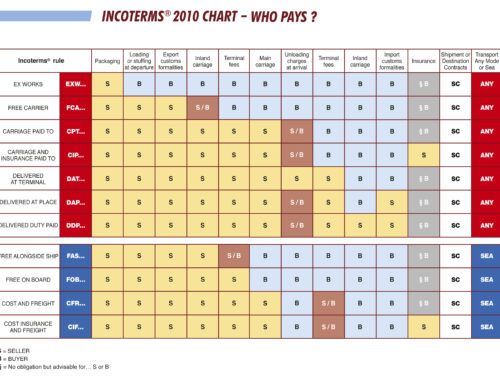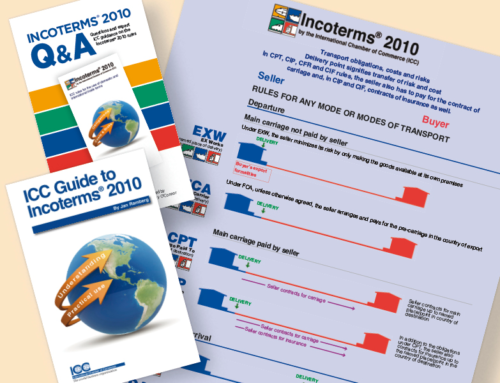










Incoterms: Who Pays What?
In our last post we stressed the importance of Incoterms and provided you with a quick reference guide. Investing 10 minutes a day to learn Incoterm definitions will save you time and money. There are only 11 – piece of cake. We are even going to break them up into two categories: “any mode of transport” and “sea/inland waterway transport only”.
Let’s take a minute to review. Incoterms are a set of rules that define the responsibilities of sellers and buyers for the delivery of goods under sales contracts. They are published by the International Chamber of Commerce (ICC) and are widely used in commercial transactions.
Remember Incoterms are about obligations, costs and risks:
- Obligations refer to responsibilities of the buyer and seller. Who is responsible for loading charges, inland freight, terminal charges, insurance, loading on vessel, freight, arrival charges, duty & taxes, delivery to destination and customs clearance?
- Costs must be clearly stated in the sale and purchase contracts as referenced in the selected Incoterm. Incoterms define costs specifically attributed to buyer and seller.
- Risk refers to the possibility of an occurrence which could cause loss or damage to goods. Buyers and sellers purchase insurance to safeguard against risk.
Now let’s focus on the Incoterm definitions. There are Seven (7) Incoterms used for any mode of transport:
EXW = Ex Works and is followed by a named place of delivery (i.e. EXW Houston)
- The seller’s only responsibility is to make the goods available at the seller’s premises.
- The buyer bears full costs and risks of moving the goods from there to the desired destination.
FCA = Free Carrier and is followed by a named place of delivery (i.e. FCA Orlando)
- The seller is obligated to deliver the goods, cleared for export, to the carrier selected by the buyer at the named place of delivery.
- The seller loads the goods if the carrier pickup is at the seller’s premises; from that point the buyer bears the costs and risks of moving the goods to the goods to the destination. If no precise point is indicated by the buyer, the seller may choose within the place or range stipulated where the carrier shall take the goods into its charge.
CPT = Carried Paid To and is followed by a named place of destination (i.e. CPT Atlanta)
- The seller pays for moving the goods to the destination.
- The risk of loss or damage to the goods and any cost increases transfers from the seller to the buyer when the goods have been delivered to the custody of the first carrier, and not at the ship’s rail.
CIP = Carriage and Insurance Paid To and is followed by a named place of destination (i.e. CIP Chicago)
CIP has the same incoterm meaning as CPT, but in addition the seller pays for the insurance against loss of damage.
- The seller pays for moving the goods to the destination.
- The buyer bears the risks of loss or damage from the time the goods are transferred to the first carrier. The seller, however, purchases the cargo insurance and is obligated to maintain insurance on minimum cover.
DAT = Delivered at Terminal with a named terminal at port or place of destination
- The seller delivers when the goods, once unloaded from the arriving means of transport, are placed at the buyer’s disposal at a named terminal at the named port or place of destination. “Terminal” includes any place, whether covered or not, such as a quay, warehouse, container yard or road, rail or air cargo terminal.
- The seller bears all risks involved in bringing the goods to and unloading them at the terminal at the named port or place of destination.
DAP = Delivered at Place with a named place of destination
- The seller delivers when the goods are placed at the buyer’s disposal on the arriving means of transport ready for unloading at the named place of destination.
- The seller bears all risks involved in bringing the goods to the named place.
DDP = Delivered Duty Paid and is followed by a named place of destination (i.e. DDP Austin)
- The seller delivers the goods – cleared for import – to the buyer at the destination.
- The seller has to pay the costs involved in shipping the goods as well as the costs and risks of carrying out customs formalities. The seller pays the duty and the buyer has to pay any additional costs caused by its failure to clear the goods for import in time.
Caution: DDP should not be used if the seller is unable to obtain an import license.
Tomorrow we will focus on INCOTERMS (sea/inland waterway transport only. Feel free to download our Incoterms 2010 Quick Reference Guide. If you need assistance with a shipment, please feel free to request a quote or contact us.















